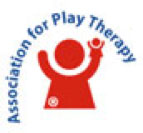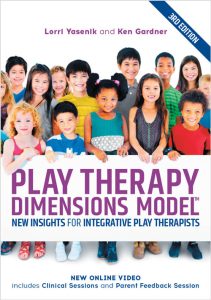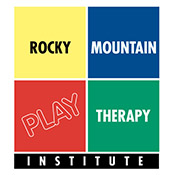Red Stream: Advanced Theory and Techniques
Play Therapist: Registration/Certification Route
The Red Stream Advanced Theory and Techniques program provides 80 hours of training. The Red Stream program is designed for licensed mental health practitioners, or graduate students enrolled in a graduate mental health degree program or in a pre licensure supervised placement.
The program consists of 9 days offered in a blended format (on-line live or in-room) (67.5 contact hours of play therapy training), plus a pre-course on-line component (with a Mastery Test), and a post-course case conceptualization assignment (totaling 12.5 non-contact hours). Students will have three months to complete the required written assignment.
As an advanced program, participants must have taken the Green Stream Foundations of Play Therapy program (or equivalent).

APT Route: To become a Registered Play Therapist (RPT) with the Association for Play Therapy (APT) one of the requirements is to complete 150 hours of training in play therapy. The Green Stream, combined with the Red Stream, provides 160 play therapy training hours.
APT credentialing standards require participants to complete play therapy training, sequentially, in three phases. In addition, instructional hours, clinical experience and supervision hours must be accrued during these three phases, in a time period of no less than two years (and no more than 7 years).
As sequential and integrated programs, the Green and Red Streams programs are conceptualized in three phases; Green Stream – phase 1 (first 5 days); Green Stream – beginning phase 2 (remaining 4 days); Red Stream – ending phase 2 (first 3 days); Red Stream – phase 3 (remaining 6 days).
APT reserves the right to review any/all training hours submitted for registration as a play therapist.
 CAPT Route: To become a Certified Play Therapist (CPT) with the Canadian Association for Play Therapy (CAPT), Canadian standards require 180 hours of play therapy training from a CAPT Approved Provider, or from an institute of higher learning. Participants who intend to become Certified Play Therapists should take the Green Stream, Red Stream +plus, and 1 core (3-day) Yellow Stream Certificate Program. It is recommended that participants take the Yellow Stream Certificate in Sandplay with Special Populations to fulfill the 180-hour requirement. CAPT reserves the right to review any/all training hours submitted for registration as a play therapist.
CAPT Route: To become a Certified Play Therapist (CPT) with the Canadian Association for Play Therapy (CAPT), Canadian standards require 180 hours of play therapy training from a CAPT Approved Provider, or from an institute of higher learning. Participants who intend to become Certified Play Therapists should take the Green Stream, Red Stream +plus, and 1 core (3-day) Yellow Stream Certificate Program. It is recommended that participants take the Yellow Stream Certificate in Sandplay with Special Populations to fulfill the 180-hour requirement. CAPT reserves the right to review any/all training hours submitted for registration as a play therapist.
Note: RMPTI is not a registering body for play therapists. Rather, RMPTI provides approved training. For details for being registered/certified with the 2 main bodies, see links below. APT and CAPT alone hold the right to accept or deny any continuing education training at their discretion
Uniquely designed
The Red Stream Program is a fully integrated training program, versus a series of workshops or courses. It is ideal for those currently in graduate programs, or graduate level mental health practitioners who wish to build on their current professional designations.
Emphasis is placed on specialized topics (e.g., family play therapy; group play therapy) and specific referral issues, such as trauma, autism spectrum, depression, and anxiety. Participants have an opportunity to practice skills in fully equipped play therapy rooms.

Based on the Play Therapy Dimensions Model, participants learn how to conceptualize the play therapy process from an integrative perspective. To further consolidate these skills each participant presents a case for group discussion (1/2 hour presentation), based on an integrative conceptualization approach.
Program Goals
The goals of this program are to:
- Demonstrate assessment and treatment-planning skills as applied to a range of special populations
- Describe the use of various play therapy modalities
- Apply practical skills as a practitioner in play therapy
Note: Students are to submit a detailed case study to facilitate integration of course material. Students will have three months to complete the required written assignment. Participants are also asked to make a case presentation (format provided) which can be used as a basis for the course assignment/case study. Presentations are meant to increase case conceptualization skills and do not count as “supervision” hours.
To access program dates see the training calendar.
For full details please refer to the application form.
Who Should Attend?
The Red Stream Advanced Theory and Techniques in Play Therapy program will be of interest to licensed mental health practitioners who are currently working with children in a treatment-oriented setting. Those currently enrolled in graduate mental health programs may also use this program as a way to build on their current professional designations.
As an advanced training course, this program will enhance your ability to market a specialization as well as prepare you for registration/certification as a Play Therapist. Registration and Certification is provided by APT and CAPT. These organizations alone hold the right to accept or deny any training related to registration/certification as a play therapist
Entrance Requirements:
- Attending or completed graduate mental health degree program
- Completion of the Green Stream: Foundations of Play Therapy Program (or equivalent).
- It is recommended that participants have a background in child development and are actively working with children in a treatment-oriented setting.
- Participants who intend to be certified with CAPT must have a student membership prior to commencing course work (this is a requirement by CAPT; membership fees are to be paid directly to CAPT). Participants in either route (APT or CAPT) should independently arrange for supervision at the outset of training.
Recommended Readings:
Yasenik. L., and Gardner, K (2023). Play therapy dimensions model: New insights for integrative play therapists (3rd ed.).Jessica Kingsley Publishers.
Schaefer, C.E. (ed) (2005). International Handbook of Play Therapy: Advances in Assessment, Theory, Research and Practice. J. Aronson, Publisher. *(Main text for online component)
Yasenik, L. & Gardner, K. (eds.) (2019). Turning points in play therapy and the emergence of self: Applications of the Play Therapy Dimensions Model. (2019). London: Jessica Kingsley Publishers.
O'Connor, K. J., Schaefer, C. E., & Braverman, L. D. (2015). Handbook of play therapy. John Wiley & Sons.
Location of Training: Customized training is held at your agency site or at the Rocky Mountain Play Therapy Institute in Calgary, Alberta Canada.
PROGRAM OUTLINE
Pre-course: Required Reading in preparation for the Mastery Test
Yasenik, L. & Gardner, K. (eds.) (2019). Turning points in play therapy and the emergence of self: Applications of the Play Therapy Dimensions Model. (2019). London: Jessica Kingsley Publishers.
Yasenik. L., and Gardner, K (2023). Play therapy dimensions model: New insights for integrative play therapists (3rd ed.).Jessica Kingsley Publishers.
Schaefer, C. E., McCormick, J., & Ohnogi, A. (Eds.). (2005). International handbook of play therapy: Advances in assessment, theory, research, and practice. Jason Aronson.
There is a mastery test to complete and participants will answer specific questions based on the assigned textbooks.
On-line live or in-room Training
The course will cover the following topics:
- Use of the PTDM in clinical work & supervision
- Use of the Client Moderating Factors Form in your practice
- Use of the Immersion/Therapist Self-Evaluation Scale
- Use of the PTDM Tracking and Observation Form
- Practical exercises using case examples
- Special topics- Neurodiversity, trauma, family play therapy, EPR, group play therapy, theraplay, filioplay therapy, anxiety, depression
Day 1: Advanced Treatment Planning using the Play Therapy Dimensions Model
Day 2: Attachment: Play-based interventions & approaches
Day 3: Attachment: Play-based interventions & approaches – Part II: Spontaneous Creative Interventions in Play Therapy
Day 4: Family Play Therapy
Day 5: Group Play Therapy
Day 6: Facilitative Play Approaches with Autism Spectrum Disorders
Day 7: Advanced Sandplay
Day 8: Working with Highly Aggressive Children
Day 9: Working with Anxious or Depressed Children; Ethics and Play Therapy
Learning Objectives
To provide participants with an opportunity to consolidate skills an integrative play therapy practitioner, utilizing a range theory and techniques as applied to specific referral issues and populations.
Upon successful completion, each participant will be able to:
- Describe how to utilize family play therapy strategies
- Explain the sandplay process and applications of sandplay therapy to working with children at different developmental stages
- Discuss play-based behaviors exhibited in children with internalizing difficulties and an understanding of specific intervention strategies
- Explain ethical and legal issues for play therapy practitioners
- Demonstrate an ability to work with children with disruptive and aggressive behaviors
- Explain play-based approaches for enhancing attachment
- Demonstrate a deepened understanding of the play therapy process and the role of the play therapist
- Demonstrate an ability to set up play therapy groups and tailor interventions for specific referral issues
- Apply use of the intuitive self while actively engaged in play therapy
- Discuss the competencies required for setting up an effective play therapy practice
Methods
- Experiential activities
- Video presentations
- Case examples
- Role plays
- Session seminars
- Reading assignments
- Case presentation & written conceptualization exercise
- Small group activities
Certificate Award
Participants will receive a Certificate in Advanced Theory and Techniques in Play Therapy from RMPTI. The certificate confirms the completion of 80 hours of specialized play therapy training. APT, CAPT, & BCPTA Continuing Education Credits will only be awarded to Mental Health Professionals. All credits must be approved by the appropriate governing body and cannot be guaranteed by RMPTI. This training meets the definition of APT’s Live-Webinar.
The Certificate is awarded based on:
- Satisfactory completion of the Mastery Test and written case study
- Continuous evaluation by instructor of course work contributions and core competencies using a structured feedback form
- Satisfactory attendance (no whole module may be missed unless there are extenuating circumstances. A makeup assignment may be requested depending on time missed)
How can I apply these skills?
- Participants will be able to work with a range of presenting issues utilizing multiple play therapy techniques in an integrated manner.
- Participants will have the ability to work with children individually, in groups, and in a family setting.
- Upon completion of the program participants will be able to develop detailed case plans and tailor interventions to specific populations.
